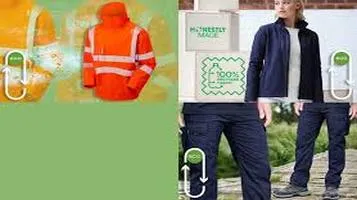Eco-Friendly Workwear: A Step Towards Sustainable Fashion
Eco-friendly workwear is an innovative approach to professional attire that prioritizes sustainability and environmental responsibility. This type of clothing is crafted from materials such as organic cotton, recycled polyester, and bamboo, which minimize the ecological footprint and reduce waste. Eco-friendly workwear not only focuses on the materials used but also on ethical production processes, ensuring fair labor practices and minimizing carbon emissions throughout the supply chain. These garments are designed to be durable and high-quality, promoting longevity and reducing the need for frequent replacements. By choosing eco-friendly workwear, companies and individuals can support a more sustainable future, demonstrating a commitment to environmental stewardship while maintaining style, comfort, and functionality in the workplace.

In an era where sustainability is no longer a mere buzzword but a pressing necessity, eco-friendly workwear has emerged as a pivotal player in the fashion industry. This sector, once dominated by fast fashion and its detrimental environmental impact, is witnessing a significant shift towards greener alternatives. Eco-friendly workwear, in particular, offers a unique blend of functionality, style, and environmental consciousness, making it a compelling choice for consumers and businesses alike.
One of the foremost aspects of eco-friendly workwear is its commitment to reducing environmental harm. Traditional workwear manufacturing processes often involve the use of non-renewable resources, harmful chemicals, and excessive water consumption. In stark contrast, eco-friendly workwear prioritizes sustainable materials such as organic cotton, bamboo, hemp, and recycled polyester. These materials not only reduce the carbon footprint but also ensure that the garments are biodegradable or recyclable at the end of their life cycle.
For instance, organic cotton, a popular choice in eco-friendly workwear, is grown without synthetic pesticides or fertilizers, significantly reducing soil and water pollution. Bamboo, another sustainable option, is renowned for its rapid growth and minimal need for water and pesticides. Similarly, recycled polyester, made from discarded plastic bottles, helps in mitigating plastic waste while offering durability and resilience akin to virgin polyester. By opting for these materials, eco-friendly workwear brands are making a substantial contribution to environmental preservation.
However, the benefits of eco-friendly workwear extend beyond environmental impact. These garments are designed with the wearer’s health and comfort in mind. Traditional workwear often contains harmful chemicals and dyes that can cause skin irritation and other health issues. In contrast, eco-friendly workwear uses non-toxic dyes and hypoallergenic materials, ensuring a safer experience for the wearer. Additionally, materials like organic cotton and bamboo are known for their breathability and moisture-wicking properties, providing superior comfort, especially in demanding work environments.
From a business perspective, investing in eco-friendly workwear can also enhance a company’s brand image and employee satisfaction. As consumers become increasingly aware of environmental issues, they are more likely to support businesses that demonstrate a commitment to sustainability. By providing eco-friendly uniforms, companies can showcase their dedication to corporate social responsibility, which can resonate positively with both customers and employees. Furthermore, employees who are provided with comfortable and health-conscious workwear are likely to experience higher job satisfaction and productivity.
The versatility and style of eco-friendly workwear are other notable advantages. Gone are the days when sustainable fashion was synonymous with bland and uninspiring designs. Today, eco-friendly workwear is available in a plethora of styles, colors, and patterns, catering to diverse preferences and professional settings. Whether it’s formal office attire, rugged outdoor gear, or casual uniforms, eco-friendly workwear brands are proving that sustainability and style can go hand in hand.
Several brands have made remarkable strides in the eco-friendly workwear sector. Companies like Patagonia, Tentree, and Eileen Fisher have set high standards by incorporating sustainability into their core values. Patagonia, for example, has long been a pioneer in using recycled materials and promoting fair labor practices. Their workwear line is a testament to their commitment to creating durable, functional, and eco-friendly garments. Tentree, on the other hand, plants ten trees for every item purchased, linking each piece of clothing to a tangible environmental benefit. Eileen Fisher emphasizes simplicity and timeless designs, ensuring that their garments remain fashionable and functional for years, thereby encouraging a reduction in consumption.
Despite the numerous benefits, the eco-friendly workwear industry does face certain challenges. One of the primary obstacles is the higher cost associated with sustainable materials and ethical manufacturing processes. While the long-term benefits of eco-friendly workwear often outweigh the initial investment, the upfront cost can be a deterrent for some businesses and consumers. Additionally, the market for eco-friendly workwear is still growing, and there may be limited options available compared to conventional workwear.
Nevertheless, the future of eco-friendly workwear looks promising. As technology advances and consumer demand for sustainable products continues to rise, it is likely that the industry will witness further innovation and expansion. More brands are expected to join the movement, offering a wider range of affordable and high-quality eco-friendly workwear options.
In conclusion, eco-friendly workwear represents a significant step towards a more sustainable and responsible fashion industry. By prioritizing environmentally friendly materials, ethical manufacturing practices, and wearer comfort, eco-friendly workwear offers a holistic solution to the challenges posed by traditional workwear. While there are hurdles to overcome, the growing awareness and commitment to sustainability among consumers and businesses alike suggest a bright future for eco-friendly workwear. Embracing this trend not only benefits the planet but also promotes a healthier and more conscious way of living and working.






